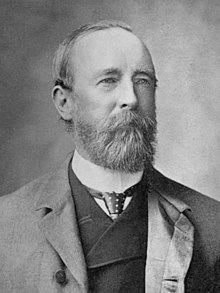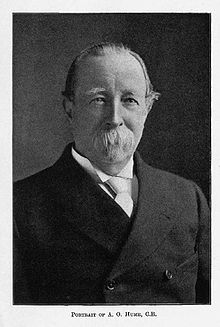Allan Octavian Hume
Allan Octavian Hume , mostly just AO Hume (born June 6, 1829 in Montrose , Angus , Scotland , † July 31, 1912 in London , England ) was a Scottish ornithologist , theosophist and politician . He was one of the founders of the Indian National Congress .
life and work
Hume was born on June 6, 1829 as one of six children of Joseph Hume and Catherine Elizabeth Burnley in Montrose, Scotland. In 1842 he served as a midshipman on the Royal Navy - Frigate Vangauard , then visited the East India Company College (now Haileybury College ) in Hertford and studied medicine at University College Hospital in London. In 1853 he married Mary Anne Grindall († 1891), the marriage resulted in a daughter.
In 1849 Hume moved to India and received a post with the Indian Civil Service in Etawah . In 1867 he was appointed Commissioner of Customs ( Customs Agent ) for the Northwest Provinces (now Uttar Pradesh appointed) and was from 1870 to 1879 Secretary in the Indian Ministry of Agriculture. His commitment to giving the Indians a greater say in domestic affairs led to conflicts with Great Britain and finally in 1879 to his relocation to an insignificant position in the north-west provinces. In 1882 he retired from the Civil Service.
After Hume met Helena Blavatsky and Henry Steel Olcott in Allahabad in 1879 , he joined the Theosophical Society in 1880 and became President of the Theosophical Lodge in Shimla in 1881 . He was instrumental in financing the magazine The Theosophist , and Hume was also the recipient of several so-called masters' letters allegedly written by the masters of wisdom . After differences of opinion with Blavatsky, he resigned from the Theosophical Society in 1883, but kept in contact with the organization and a number of leading theosophists.
After his retirement in 1882, Hume began to get involved in politics. He advocated more democracy and self-government for India vis-à-vis Great Britain and played a leading role in founding the Indian National Congress (INC) in 1885. From its inception until 1908, he was Secretary General of the INC.
From 1862 to 1884 he worked as an ornithologist , during which time he collected around 102,000 ornithological exhibits from the Indian subcontinent. In 1894 he returned to England and in 1910 founded the South London Botanical Institute in London, which still exists today .
The Indian Post dedicated a stamp to him in 1973.
Works (selection)
- A speech on the Indian National Congress, its origin, aims and objects, delivered . Calcutta Central Press Co., Calcutta 1888.
- Agricultural Reform in India . WH Allen & Co., London 1879.
- SR Mehrotra, Edward C. Moulton (Ed.): Selected writings of Allan Octavian Hume . Oxford University Press, Oxford 2004, ISBN 0-19-565896-5 .
- The game birds of India, Pakistan, Bangladesh, Burma and Sri Lanka . Bhavana, New Delhi 1994.
literature
- Norbert Lauppert (ed.): The Mahatma letters to AP Sinnett and AO Hume . Adyar Verlag, Graz 1977–1982, ISBN 3-85005-058-0 (1st volume), 3-927837-27-X (2nd volume), 3-927837-28-8 (3rd volume).
- William Wedderburn: Allan Octavian Hume, father of the Indian National Congress, 1829-1912 . Oxford University Press, Oxford 2002, ISBN 0-19-565287-8 .
- Bishamber Dayal Yadav: AO Hume, BD Yadav, SR Bakshi, Indian freedom fighters, struggle for independence . Anmol, New Delhi 1991, ISBN 8170415279 .
Web links
- Allan Octavian Hume, British colonial official. Encyclopædia Britannica (English).
- Allan Octavian Hume. Brief biography of the Indian Post on the occasion of the issue of a commemorative stamp
Individual evidence
- ↑ St Mary Cray , Kent (now London Borough of Bromley ), England is sometimes given as the place of birth .
- ↑ a b c Hume, Allan Octavian (1829-1912) Short biography on the Zoonomen portal , accessed on December 13, 2019 (English).
- ↑ Family tree of Joseph Hume ( Memento from April 16, 2005 in the Internet Archive ).
- ^ A b Allan Octavian Hume, British colonial official. Encyclopædia Britannica (English).
- ↑ Mark Bevir: Theosophy as a Political Movement. In: A. Copley (Ed.): Gurus and their Followers: New Religious Reform Movements in Colonial India. Oxford University Press, Delhi 2000.
- ^ The Theosophical Movement, 1875-1950. The Cunningham Press, Los Angeles 1951, 70.
- ^ The unknown side of Hume. The Hindu , September 21, 2004 (book review of Selected Writings of Allan Octavian Hume. Vol. 1, 1829-1867 ).
- ^ A b Allan Octavian Hume, Issue Date 31/07/1973. Indian Post.
- ↑ About us. South London Botanical Institute.
| personal data | |
|---|---|
| SURNAME | Hume, Allan Octavian |
| ALTERNATIVE NAMES | Hume, AO |
| BRIEF DESCRIPTION | Scottish ornithologist, theosophist and politician |
| DATE OF BIRTH | June 6, 1829 |
| PLACE OF BIRTH | Montrose (Angus) , Scotland |
| DATE OF DEATH | July 31, 1912 |
| Place of death | London |

